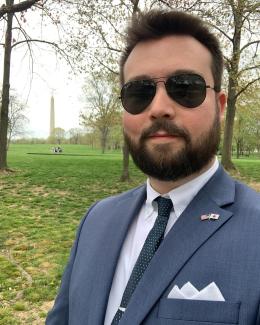
Earlier this month President Biden welcomed Prime Minister Fumio Kishida of Japan for an official State Visit to celebrate the continued friendship between our two countries. I had the distinct privilege of attending the accompanying State Luncheon on April 11, hosted by Vice President Kamala Harris and Secretary of State Antony Blinken in Washington, D.C.
V.P. Harris gave strong introductory remarks citing her friendship and mentorship from Norman Mineta as an important aspect of her political career. For those unfamiliar, Mineta was the highest ranking Japanese American politician in federal government who served as Secretary of Commerce in the Clinton Administration and Secretary of Transportation to President George W. Bush. P.M. Kishida also shared warm remarks about the continued commitment to bilateral trade and other strategic partnerships with the U.S. They also used this opportunity to announce the space program partnership between Japan Aerospace Exploration Agency (JAXA) and NASA that aims to land a Japanese astronaut on the moon by 2026.
It was a great honor to represent the Commonwealth of Pennsylvania at the luncheon. Having spent the past few years working professionally in the citizen diplomacy arm of U.S.-Japan relations as an employee of the Japan America Society of Greater Philadelphia, the luncheon provided a great opportunity to reconnect with many friends and colleagues across the country who are engaged in this work.
As one of a dozen or so multigenerational (Sansei or third-generation plus) Japanese Americans present for this occasion, I was also pleasantly surprised to see friends in leadership from various Japanese American community organizations such as Japanese American Citizens League, U.S.-Japan Council, and Japanese American National Museum.
It is encouraging to see more Japanese Americans getting involved in the U.S.-Japan relations space, and even more so, that the Department of State recognizes the important role our community has played in building the U.S.-Japan strategic alliance.
Whether through circumstance or intentional design, the Japanese American community has historically been excluded from most official diplomatic channels related to U.S.-Japan relations. Yet it is our community who suffers the most when these relations sour. The wartime incarceration is an obvious example, but even in my own childhood amid the U.S.-Japan trade war of the late 1980s and early 1990s, I recall an extreme amount of prejudice targeted at me and my family living just over an hour’s drive outside of New York City. Anti-Asian hate crimes have been on the rise nationwide throughout the past three years and closer to home Shofuso, our only Japanese structure in the city of Philadelphia, was vandalized in June 2022.
In light of these more recent events, I feel there is a certain immediacy in the need to be
involved in work that continues to strengthen the relationship between our two countries.
While this is not a singular solution, strengthening the U.S.-Japan relationship is one means of safeguarding our Japanese American community from further instances of violence. This can be done effectively on the local level by engaging in cultural and educational programming that demystifies Japan, its culture and its people.
In the exhibition I curated last year titled, Okaeri (Welcome Home): The Nisei Legacy at Shofuso, we explored the methods by which Nisei (second-generation Japanese American) leaders who resettled in Philadelphia after the wartime incarceration engaged the public through Japanese cultural programming for this express purpose. The exhibit remains on view at Shofuso through the 2024 season.
As we continue strengthening this important bilateral relationship, I hope to see more Japanese Americans empowered to not only participate in meaningful ways, but also be given leadership roles in the conversation between our two nations.
